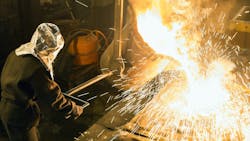Defense-Focused Program to Boost Manufacturing Workforce
A new initiative formed by some federal agencies and academia seeks to address “critical workforce shortages” for U.S. manufacturers – specifically for metalcasting and forging operations. METAL, the Metallurgical Engineering Trades Apprenticeship and Learning program, will serve as a “strategic countermeasure to fortify national defense through workforce empowerment and technological sovereignty,” according to the sponsors. Specifically, the U.S. Dept. of Defense has determined that at least 122,000 more manufacturing workers are needed to support its national defense objectives by 2028.
The partnership ties the Institute for Advanced Composites Manufacturing Innovation (IACMI, an extension of the U.S. Dept. of Energy) together with the Dept. of Defense’s Industrial Base Analysis and Sustainment (IBAS) program, and with Pennsylvania State University, the University of Tennessee-Knoxville, and Jobs for the Future (a not-for-profit), to drive a “strategic countermeasure to fortify national defense through workforce empowerment and technological sovereignty.”
The METAL initiative is supported by the DoD’s IBAS program, which aims to strengthen the U.S. industrial base in response to national security threats and to promote workforce development initiatives. IBAS also seeks to cultivate a domestic workforce strong enough to sustain and advance U.S. casting and forging capabilities through 2050.
As it works to revitalize the manufacturing workforce, METAL will address vulnerabilities in the U.S. defense supply chain, so that it is not dependent on foreign sources for cast and forged products critical to warfighting capabilities.
"The shrinking supply chain and shortage of skilled labor demands an immediate response,” stated Dr. Matthew Draper, technical director of Metallurgy and Manufacturing for the Office of the Assistant Secretary of Defense for Industrial Base Policy. “Our partnerships equip us to develop robust training programs that not only meet the immediate needs but also prepare the workforce for future technological advancements. This is something that will provide a cornerstone for the future of the casting and forging sector and provide opportunities for individuals to move into good paying, dynamic, and meaningful careers."
Building on IACMI's record in developing technical training networks, the METAL partnership will scale up educational programs focusing on processes in casting, forging, and plate production. The goal is to expand the pool of skilled professionals ready to start and sustain careers in metalcasting and forging industries. This will start by “engaging a diverse audience” of K-12 students, college, and university students, and adults who are seeking further training or looking for pathways into the industries.
“Fostering development of an industrial base workforce and ensuring the right skill sets are available – from skilled trades on the shop floor through doctorial-level engineering capabilities in a research setting – is vital to national security,” stated Joannie Harmon, IACMI vice president of workforce development.
Pennsylvania will be a “testbed” for the METAL project. Curriculum will be collaboratively developed and students will participate in a pilot program in casting and forging.
Online and in-person curriculum are being co-developed by PSU and UT for a variety of audiences, including: outreach events for elementary school students; two/three hour workshops for middle and high school students; five-day bootcamps for students age 18 and over; and metallurgical engineering courses and certificate programs
Additional training hubs are planned for strategic locations in additional states.
Harmon continued: “Our goal for METAL is to ensure the nation’s advanced manufacturing workforce is a source of strategic and competitive advantage for the United States. The foundational building block for all manufacturing starts with metal. Supporting the casting and forging sector is a critical role IACMI plays in the creation of a robust talent pipeline with twenty-first century capabilities and skills.”
